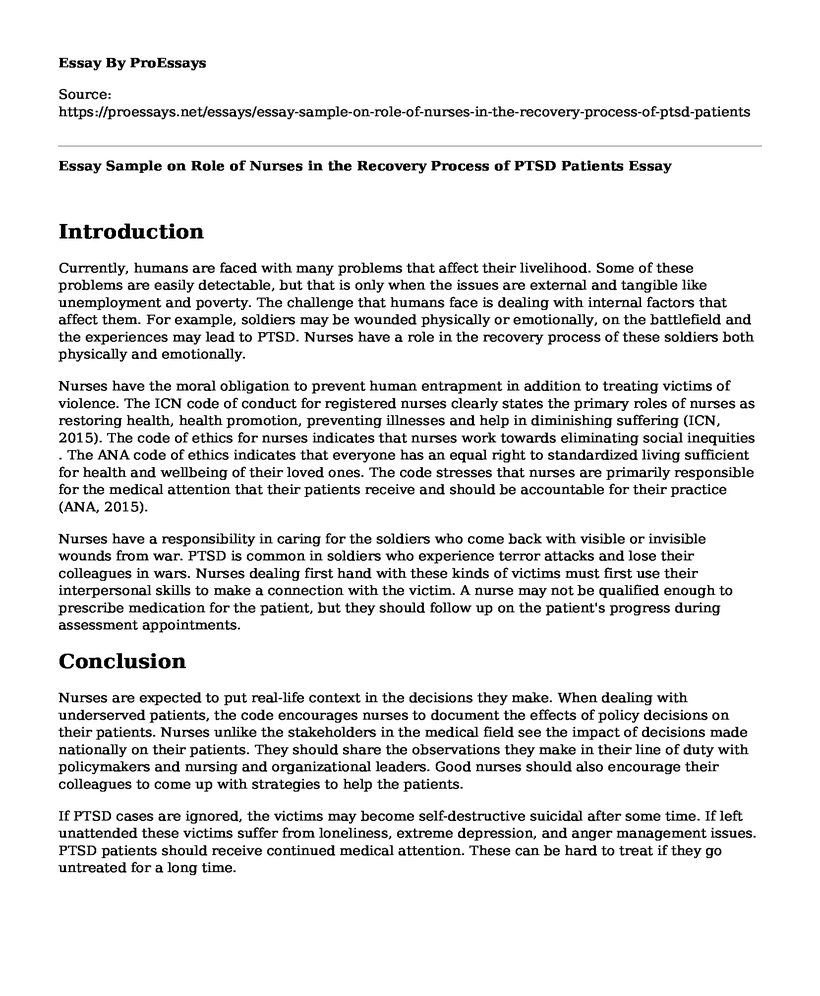Introduction
Currently, humans are faced with many problems that affect their livelihood. Some of these problems are easily detectable, but that is only when the issues are external and tangible like unemployment and poverty. The challenge that humans face is dealing with internal factors that affect them. For example, soldiers may be wounded physically or emotionally, on the battlefield and the experiences may lead to PTSD. Nurses have a role in the recovery process of these soldiers both physically and emotionally.
Nurses have the moral obligation to prevent human entrapment in addition to treating victims of violence. The ICN code of conduct for registered nurses clearly states the primary roles of nurses as restoring health, health promotion, preventing illnesses and help in diminishing suffering (ICN, 2015). The code of ethics for nurses indicates that nurses work towards eliminating social inequities . The ANA code of ethics indicates that everyone has an equal right to standardized living sufficient for health and wellbeing of their loved ones. The code stresses that nurses are primarily responsible for the medical attention that their patients receive and should be accountable for their practice (ANA, 2015).
Nurses have a responsibility in caring for the soldiers who come back with visible or invisible wounds from war. PTSD is common in soldiers who experience terror attacks and lose their colleagues in wars. Nurses dealing first hand with these kinds of victims must first use their interpersonal skills to make a connection with the victim. A nurse may not be qualified enough to prescribe medication for the patient, but they should follow up on the patient's progress during assessment appointments.
Conclusion
Nurses are expected to put real-life context in the decisions they make. When dealing with underserved patients, the code encourages nurses to document the effects of policy decisions on their patients. Nurses unlike the stakeholders in the medical field see the impact of decisions made nationally on their patients. They should share the observations they make in their line of duty with policymakers and nursing and organizational leaders. Good nurses should also encourage their colleagues to come up with strategies to help the patients.
If PTSD cases are ignored, the victims may become self-destructive suicidal after some time. If left unattended these victims suffer from loneliness, extreme depression, and anger management issues. PTSD patients should receive continued medical attention. These can be hard to treat if they go untreated for a long time.
References
ANA. (2015, May 23). Retrieved from The Nurse's Role in Ethics and Human Rights: Protecting and Promoting Individual Worth, Dignity, and Human Rights in Practice Settings: https://www.nursingworld.org/~4af078/globalassets/docs/ana/ethics/ethics-and-human-rights-protecting-and-promoting-final-formatted-20161130.pdf
ICN. (2015, september 14). ICN Code of Ethics for Nurses. Retrieved from ICN Code of Ethics for Nurses: http://ethics.iit.edu/ecodes/node/5695
Cite this page
Essay Sample on Role of Nurses in the Recovery Process of PTSD Patients. (2022, Aug 10). Retrieved from https://proessays.net/essays/essay-sample-on-role-of-nurses-in-the-recovery-process-of-ptsd-patients
If you are the original author of this essay and no longer wish to have it published on the ProEssays website, please click below to request its removal:
- Personal Essay Sample: Feeling of Being in the Presence of God
- Aging Effects and Personality Essay
- The Role of Culture in Health Communication Post Reflection Paper
- Trinity Community Hospital's Risk Assessment Paper Example
- Essay Example on Ebola Virus: Natural Reservoirs & Deadly Disease in Africa
- Essay Example on Fairtrade Social Movement: Securing a Better Future for Coffee Farmers
- Peripheral Neuropathy & Diabetes: Prevention & Treatment Strategies for Nurses - Research Paper







